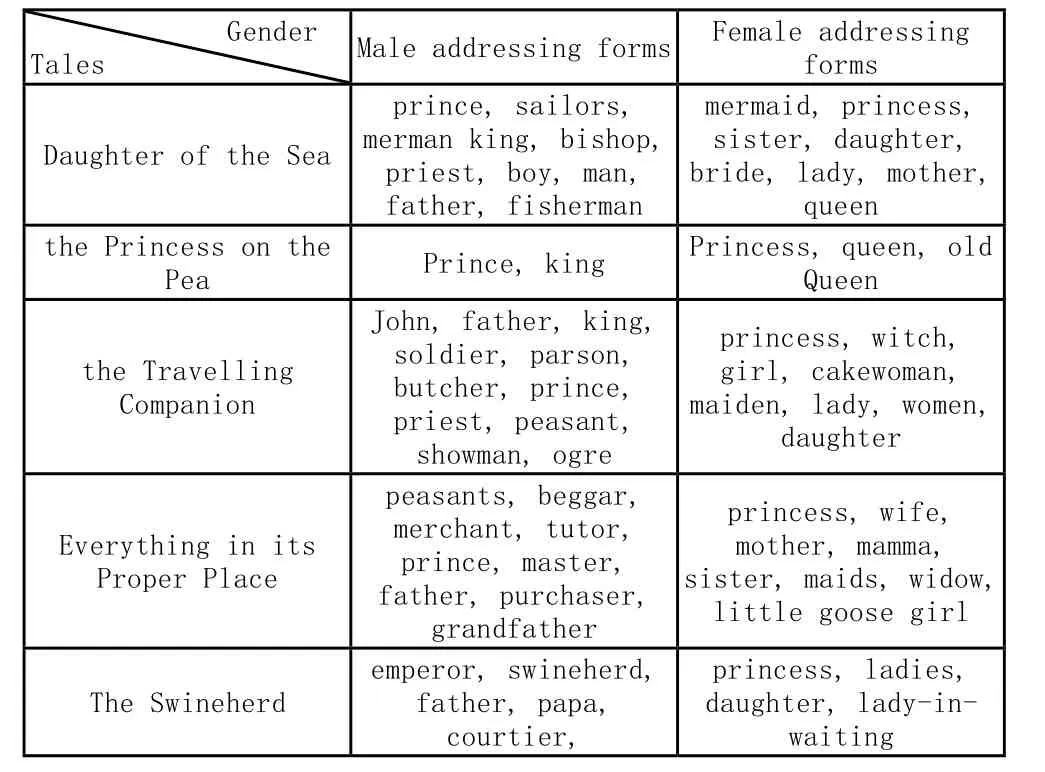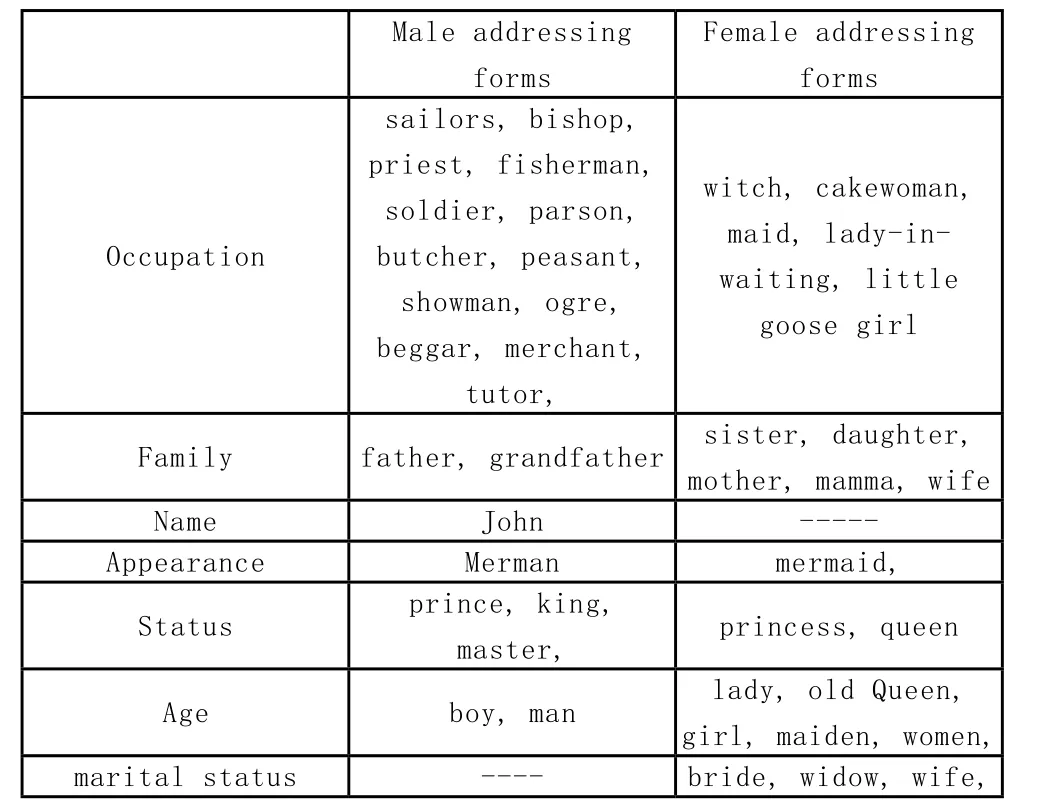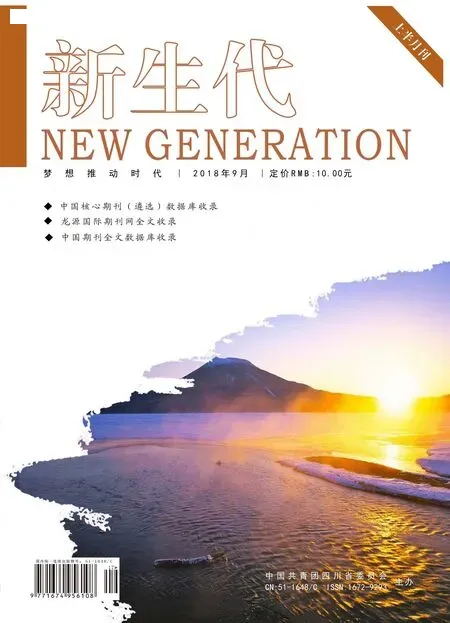Addressing Forms of Gender in Andersen's Five Fairy Tales
魏煜翎
東北師范大學外國語學院 130024
1. lntroduction
Andersen’s Fairy Tales, which is world famous,has delighted a huge number of children of the world. It influences the children both in the western world and in the eastern world from generation to generation. It helps to establish values and attitude the world. Besides, it constructs children a simple understanding towards gender roles. This thesis is intended to explore the different gender addressing forms in this classic fairy tales by analyzing three tales.
This thesis makes a research on the addressing forms of gender in Andersen’s 5 fairy tales respectively Daughter of the Sea, the Princess on the Pea, the Travelling Companion, Everything in its Proper Place and The Swineherd. The differences of addressing forms and different images of gender are covered in this study from the perspective of Critical Discourse Analysis. This paper aims at answering two questions. What are the differences of addressing forms between male and female? What character images are presented by the use of addressing forms?
2. Description of Different Gender
Addressing forms are various according to the relationship between the speaker and hearer.There are different choices to address a person,for example, the occupation, the appearance, the surname, pronouns and other possibilities. The addressing forms of men and women are supposed to be different. In this section, numbers and categories of males and females are explored by simple descriptive statistics. In five tales, Daughter of the Sea, the Princess on the Pea, the Travelling Companion, Everything in its Proper Place and The Swineherd, the addressing forms used by the author and the characters are listed in Table 1. Personal pronouns are excluded. Besides, addressing forms of animals and supernatural figures are neglected here,such as god elves and etc. The addressing forms are arranged based on the frequency of each addressing forms. We can see that the numbers of addressing forms of different genders are of little difference.There are 37 kinds of males addressing forms and 30 kinds belong to female
Additionally, the addressing forms of the five fairy tales are classified by their semantic features. The result is shown in Table 2. The paper classifies them into 7 types including occupation,name, family, appearance, status, age and marital status.
There are totally 43 addressing forms in the five fairy tales. It is apparent that the number of occupation addressing form of males is much more than that of females. The family addressing forms occur more frequently than those in male addressing forms. In addition, in these tales, some addressing forms of females are about marital status such as bride, widow and wife. However, there is none in male addressing forms. Therefore, there are many descriptions about gender difference in vocabulary and their connotative meaning.

Table 1. Addressing Forms of Males and Females in the Five Tales

Table 2.Different Categories of Gender Addressing Forms
3. lnterpretation of Gender lmages
When people take a close look at the image presentation of addressing forms, some differences between males and females can be figured out.Addressing forms related to occupation of males and females make a sharp contrast. The interaction between the writers and readers can be seen through the text. The gender difference of addressing forms mirrors some factors in society. Thus, this section interprets the images the author presents to us.
Firstly, readers will notice that males are always addressed with their occupations in the tales. This shows the independence and ability of a person. Most of them are decent jobs with relatively high social positions like bishop, priest, parson,butcher, showman, ogre, merchant and tutor. Some shows the strength of males like soldier, sailors,fisherman and peasant. However, there is fewer occupation addressing forms for women. Maid,cakewoman and lady-in-waiting are jobs with low status and low salary while witch has negative meaning. For example, in the Daughter of the Sea,a witch has magic and gives the mermaid feet but takes away her voice. This lead to prince’s misunderstanding and mistakes the other girl as his savior. His marriage results the death of the mermaid. In The Swineherd, except for prince and princess, ladies-in-waiting play an important role in the story. They have low status and witness the kiss between the prince and king. They follow the princess obediently and do not have individuality and feature in the tale. Therefore, this occupation is indecency at that time. In the Travelling Companion, John was desperate for his father’s death. His father told him that God would help him in this world before he was dying. He goes to the parson and prays for his father. The priest is a sainted man who preaches and atones for others’crime.
Second, more addressing forms of women are related to family such as sister, daughter, mother,mamma and wife. This reveals a social stereotype,that is, women tend to work with low status and most of women’s jobs are limited to domestic fairs. By contrasting, the reader can figure out that males,to a great extent, play a more important role in society than females. However, the center of women’s lives is family. For instance, in Everything in its Proper Place, it says, “The new owner took himself a wife, and who do you suppose she was but the pretty little goose girl, who had always been so faithful and good!” The verb “took” reveals his master status and women’s subordinate status. Besides, there is another sentence with gender addressing forms -“The mother managed the household affairs, and the father superintended the estate…” Although “mother” and“father” both belong to family addressing forms,it is apparent that the woman deals with housework while the man is the masters of the house.
This section introduces the categories and differences of gender addressing forms in detail.The gender images constructed by the addressing forms can be easily seen. Andersen’s fairy tales are created in Danmark. This classic fairy tale collection is of great value but also has ideology of the time and society. On the one hand, in the character shaping of Andersen’s fairy tales,females are limited to domestic fairs and they are inferior to males. On the other hand, males play a more important role in the development of society.They do most of the decent and powerful jobs.However, relatively speaking, women contribute a little.
4. Summary of Findings
As for the gender differences of addressing forms, males’ addressing forms are more about occupation and females’ are related to family and occupations with low status and salary. As for images, in Andersen’s Fairy Tales, the males play a more important role in society and put forward the development of the society. They tend to have jobs with high salary and status such as priest or merchant. However, females play a subordinate role in society and their occupation is more about domestic fairs.
As for social determinants, this kind of gender inequality is influenced by social instability. The failure of the war causes destruction of economy.Females’ strength is naturally disadvantaged and could not contribute to the war. Therefore, males play a more important role in social development.As for social effects, the false portray of gender images can lead to the deformed development of children’s psychology. Girls will believe that they are less important and perform worse than boys. Their job expectations can be weakened without proper guidance. Their confidence in future career and ability should be improved and stress their independence in education process.Andersen’s fairy tales influence the children a lot in the children’s development all over the world. Limitations of the time should be noticed and ideology should be dug out to practice children’s critical ideas. The girls who read the tales should not only be impressed by the beautiful appearance of the heroine but the bravery or ability. Educators and parents should give proper guidance in teaching children, especially girls.

